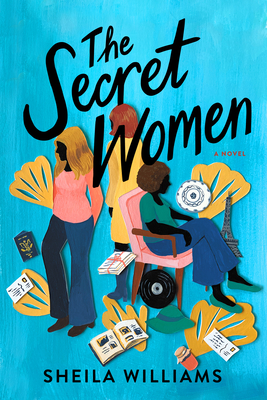 The Secret Women by Sheila Williams
The Secret Women by Sheila Williams Format: eARC
Source: supplied by publisher via Edelweiss
Formats available: paperback, ebook, audiobook
Genres: relationship fiction, women's fiction
Pages: 304
Published by Amistad on June 9, 2020
Purchasing Info: Author's Website, Publisher's Website, Amazon, Barnes & Noble, Kobo, Bookshop.org
Goodreads
The author of Dancing on the Edge of the Roof, now a Netflix film starring Alfre Woodard, returns with a riveting, emotionally rich, novel that explores the complex relationship between mothers and daughters in a fresh, vibrant way—a stunning page-turner for fans of Terry McMillan, Tayari Jones, and Kimberla Lawson Roby.
Elise Armstrong, Carmen Bradshaw, and DeeDee Davis meet in a yoga class. Though vastly different, these women discover they all have one thing in common: their mothers have recently passed away. Becoming fast friends, the trio make a pact to help each other sort through the belongings their mothers’ left behind. But when they find old letters and diaries, Elise, Carmen, and DeeDee are astonished to learn that each of their mothers hid secrets—secrets that will transform their own lives.
Meeting each month over margaritas, the trio share laughter, advice, and support. As they help each other overcome challenges and celebrate successes, Elise, Carmen, and DeeDee gain not only a better understanding of the women their mothers were, but of themselves. They also come to realize they have what their mothers needed most but did not have during difficult times—other women they could trust.
Filled with poignant life lessons, The Secret Women pays tribute to the power of friendship and family and the bonds that tie us together. Beautiful, full of spirit and heart, it is a thoughtful and ultimately uplifting story of unconditional love.
My Review:
I picked this up because the story was wrapped around family secrets that three women discover in the process of grieving for their mothers’ deaths. This was also the central theme of another book that I read recently, the excellent but completely different Millicent Glenn’s Last Wish by Tori Whitaker.
Although the stories share something besides their theme, as both are set in my own hometown of Cincinnati, Ohio.
I’m attracted to stories like these because I lost my own mother three years ago this December. Everyone’s grief process is different, although stories like this certainly all live up to that old saying about all happy families being alike while misery seems to have a thousand mothers – and fathers.
But stories like this one have resonance for me, especially this time of year, and especially when the women are somewhere in mid-life or thereabouts, as Elise, Carmen and DeeDee certainly are.
All three women are somewhere in mid-life, all are black, and all are having difficulties dealing with the deaths of their mothers – however recently or not. And all of them are stuck wading through the detritus left behind, both in the sense of physical material and emotional baggage.
Elise in particular has an entire apartment full of stuff to go through and make decisions about. Her mother was a ruthlessly organized woman, which is the only thing that kept her from being featured as a hoarder. Her condo and its storage area are full to the brim with her many, many collections, starting with, but definitely not ending with, 15 complete sets of dishes. Not 15 place settings of dishes, 15 sets of 12 or so place settings each. Along with similar amounts of clothing, jewelry, collectibles, knick-knacks and whatnots. Lots of whatnots.
So these women bond, a bit over their yoga class and their snarky comments about their rigid drill instructor of an instructor, somewhat over the losses they haven’t managed to process, and definitely over a shared need to make peace with the women their mothers’ were by dealing with the secrets they left behind.
And the boxes. Boxes of jewelry, boxes of letters and especially boxes of secrets that bring home the realization that none of them really knew their mothers, not the secret women that their mothers really were.
Escape Rating A: Elise, Carmen and DeeDee have reached this point from three very different journeys, and the secrets that they uncover, both about their mothers and about themselves, are all equally different. They cover a spectrum of mother-daughter relationships and women’s lives that will have a lot of resonance for any woman.
Elise is the one with the most regret, DeeDee is the one who has the most to remember, and Carmen is the one who uncovers the biggest revelation.
There, that was cryptic.
Elise has both the hardest journey, because her loss is the most recent, but also the simplest. She has to empty her mother’s condo and she has to forgive herself for not accepting her mother’s new romantic relationship. Her mother moved on from her father’s death, while Elise mostly didn’t. But there are relatively simple ways for Elise to still find closure and forgiveness, and she eventually does. Her issues aren’t easy – none of this is easy, but they are simple.
DeeDee, whose mother has been gone the longest, has to reach back into her own memory to reset what she thinks and feels about her mother, and how those memories have affected her relationships with her sister and her own daughters.
Bipolar disorder runs through DeeDee’s family, and her mother suffered from both that disorder and severe postpartum depression, which most likely exacerbated each other. The traumatic childhoods of both DeeDee and her sister – who inherited the disorder – still haunts her. In finally opening the boxes her mother left behind, DeeDee is finally able to remember the good as well as the bad, and to begin to let her own daughters know the artistic genius their grandmother was.
The secrets that Carmen uncovers change her perception of who she herself is and her place in the world, as the boxes her mother left behind reveal her life as a young woman, before she married Carmen’s father and became a preacher’s wife. A time when she traveled the world. A time when she married Carmen’s natural father. When she became a very young widow, and when her young husband’s mother erased both Carmen and her mother from her dead son’s life. Because his mother never accepted her son’s black, gentile wife and their mixed race child.
Carmen’s mother believed that her first mother-in-law’s rejection and erasure was solely because she was black. It’s possible that at least some of that attitude was religiously motivated, as it was not unheard of for Jewish parents at that time to consider a child who married outside the religion to be dead and to perform funeral rites over them, to sit shiva and say kaddish. Whatever the motivation, it was despicable treatment that sent Carmen’s mother back home to her family, to her childhood best friend, to the man who Carmen knew as her father for her entire life.
Until she opened those boxes and discovered her mother’s past.
But all three women find a marvelously supportive friendship with each other. A burden shared is, after all, a burden halved. Or in this particular case, thirded. They all find some much-needed closure, they all make a bit of peace, and they all move forward. For this reader, the story was tremendously cathartic, especially as I found touchstones to my own journey among theirs.
I really wish I could take that yoga class with them – although I’m not too sure about maintaining the headstand pose. But friendship like theirs would definitely be worth the effort!

















